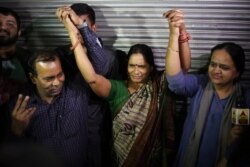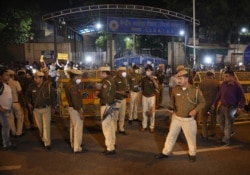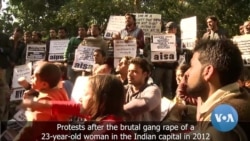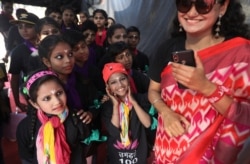More than seven years after the brutal gang rape and murder of a 23-year-old physiotherapy student in New Delhi sparked outrage across the world, four men convicted of the crime were hanged at dawn Friday in a high-security city prison.
Called the “most brutal, barbaric and diabolical” crime by the Supreme Court, the 2012 gang rape shook India’s conscience and turned the spotlight on sexual violence against women in India.
Jyoti Singh was raped and tortured with a metal rod by five men and a juvenile on a bus she had boarded with a male friend after watching a film one night. They left her bleeding on the side of the road, and she died two weeks later of the injuries she suffered.
Peace, justice for daughter
Minutes after their hanging, the victim’s mother, Asha Devi, said her daughter’s soul would rest in peace.
"I hugged my daughter's photograph and told her we finally got justice," she said.
Her father, Badrinath Singh, said his faith in the justice system had been restored.
The parents had often expressed anguish at the delay in carrying out the sentence that was handed down in 2013, as the convicts filed several appeals and mercy petitions to reduce their sentences, including a last-minute one Thursday.
Outside the prison, where scores of police had been deployed, a crowd shouted slogans to celebrate the executions. Some held placards saying, “Justice for women” and “Hang the culprits.”
The four men were all low-income workers. Akshay Thakur was a bus cleaner, Pawan Gupta a fruit seller, Vinay Sharma a gym instructor and Mukesh Singh was unemployed.
One of the six convicted men had allegedly committed suicide in jail and the juvenile, was released after three years in detention.
The execution of the four culprits brings closure to a city where the gang rape brought tens of thousands of anguished young people into the streets with a rallying cry of justice for the victim and an end to such horrific crimes.
Safety elusive
While the call for justice for the young woman who came to be known as “Nirbhaya,” or fearless, by the Indian media has been met, the second –- safety for women -- remains elusive.
“Almost every day, there is news of rape. I don’t think it has changed a bit,” Varsha Kar, who works in a business hub near New Delhi, said.
More than 2,000 rape cases were reported in 2018 in the capital. The figure is higher than in 2012, partly because more women report the crime that they earlier hesitated to bring out in the open. More than 33,000 were reported nationwide.
Women’s rights activists warn that stringent laws against sexual assault brought into force after the gang rape have not been a deterrent in a city that ranks as having the most dangerous public spaces for women in the world, be they streets or transport.
“In terms of absolute change, I don’t see much has happened in the way women have been targeted and the heinousness of the crime,” Ranjana Kumari, director of the Center for Social Research in New Delhi, said.
Since the incident, tens of thousands of women have attended self-defense classes organized by the police. The Delhi government says it has put marshals and CCTV cameras on buses and improved lighting on streets. There is a helpline for women.
Constantly alert
This has done little to inspire confidence and the continuing tide of sexual violence remains a constant worry. Aastha Sharma, a brand manager at a food delivery company, learned karate in school, she said, but is always careful.
“I keep a pepper spray in my bag and always keep my emergency contacts, like my parents and my friends, on speed dial,” she said.
Women say they must be constantly alert while driving, especially at night.
“I make sure there is no car, there is no bike, there is nothing that is following me. There’s always a person on call that I am talking to,” travel and food writer Ayandrali Dutta said.
Violent sexual assault is not the only problem – women routinely complain of harassment such as groping, lewd comments or stalking in the streets of the capital.
“People are passing comments, looking at you in a wrong way. This is one of the biggest problems in Delhi,” college student Tanya Jain said.
“It’s like as if people haven’t seen girls before in their lives,” she added.
The 20-year-old’s parents do not allow her out late in the evening out of concern for her safety.
Immediate problem: courts
Female activists say that in the long run one of the major challenges is to change attitudes and patriarchal mindsets that are blamed for the continuing tide of sexual violence against women.
In the short run, though, the main obstacle in improving safety, according to activists, is a slow-moving justice system.
While the massive outcry in the Nirbhaya case prompted sentences being handed down in a record seven months, tens of thousands of cases languish despite the establishment of fast-track courts to try rape cases.
“You can have the best of laws, but if laws are not effectively implemented, certainly nobody is fearing the law,” Kumari said.
“Swiftness and certainty of punishment is what should have happened after Nirbhaya,” she said. “But almost 117,000 cases are pending in courts. What about all these who are still seeking justice?”
The failure to improve safety for women has caused huge anger and frustration not just in Delhi, but across the country, and every so often, that anger spills into the streets.
In a November case reminiscent of the Nirbhaya gang rape, massive protests erupted after a 27-year-old woman was allegedly raped and murdered in the southern city of Hyderabad, and her body set on fire.
The suspects were shot dead by police, who said they stole guns and tried to escape when they were taken to the scene of the crime.
Reflecting a worrying loss of public faith in the meandering delays in the country's criminal justice system, many celebrated their deaths before they had faced the due process of law.













